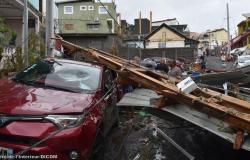Author:
An analysis by Christine Wanner
20.12.2024, 14:55
In retrospect, the misconduct of the CS management and the dealings with the big bank appear in a staggered sequence: delayed legal requirements for banks, relaxed supervisory requirements for the CS, simultaneous scandals and remuneration for the CS management.
Interventions at the bank went unheard. So the bank looked stable on paper, although the warning signs have been constant companions over the last ten years. Lessons must now be learned from this – with a view to the one remaining globally active, systemically important bank.
The PUK comes to the conclusion: The CS crisis was self-inflicted – years of mismanagement and scandals. The authorities and supervisory authorities did keep an eye on CS and bank stability – there was a report on this every two years and annual checks at the bank.
But the PUK also shows that CS received relief from its equity requirements. So their situation looked better than it actually was. Because the bank no longer met the capital requirements in 2021 without the relief.
Political co-responsibility
At the same time, the Federal Council and Parliament delayed the rapid implementation of the necessary instruments within the framework of the “too big to fail” legislation on banks. Efforts to give Finma the supervisory authority more enforcement power also failed politically. In concrete terms, this meant that in practice there were too many gaps in the regulation of the big bank.
Supervision had too little enforcement power
The lessons from the 2008 financial crisis and the UBS rescue were clearly not drawn consistently enough in Switzerland. This took revenge in the case of CS. The PUK also shows this and these experiences must shape the further political discussion.
The warning signs were there
Attempts to bring the CS leadership to reason failed. Even though Finma intervened several times, the CS management did not change its behavior. She did not create any transparency about her financial situation, paid billions in fines and paid herself billions in remuneration.
The supervisory authority remained skeptical. But the early crisis detection did not work. The risk of a crisis was assessed as low between 2017 and the beginning of 2023. It was only in February 2023 – shortly before the takeover by UBS – that this risk was upgraded to “possible”.
Lack of information among those involved
As of autumn 2022, the Federal Council as a whole was not well enough informed about the actual status of the big bank. There was also not enough detail when the Finance Department was handed over from Federal Councilor Ueli Maurer to Federal Councilor Karin Keller-Sutter. Meetings were not recorded, nor were confidential meetings – also for fear of leaks that could further weaken the CS.
Once again: never again…
The PUK’s recommendations are clear: Improvements are needed – in cooperation between authorities, in the enforcement of supervision, in crises, in legislation on banks. Keywords here: equity, liquidity – relief like the one CS received should be limited.
They go to Parliament and the Federal Council, which will set their own priorities. With the experience after the 2008 financial crisis and knowledge of the last ten years of the CS, the PUK is clear: politics should be guided by the idea of “never again”. Switzerland is left with one last G-SIB – a globally active, systemically important bank.
Christine Wanner
Federal House editor
Open the people box
Personen-Box suction cups
Christine Wanner has been editor of the Federal Palace since 2022. She previously worked as a domestic editor for Radio SRF. She studied economic, social and environmental history as well as media studies at the University of Bern. Wanner was particularly concerned with how society deals with risks and dangers – for example in the nuclear issue and in dealing with natural disasters.
Here you will find further articles by Christine Wanner and information about her.






